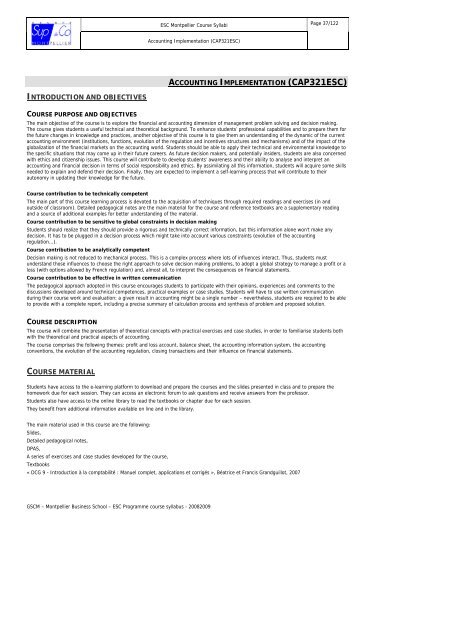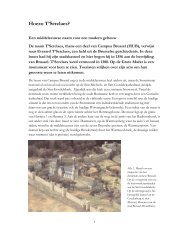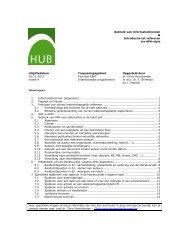esc montpellier course syllabi groupe sup de co ... - HUBRUSSEL.net
esc montpellier course syllabi groupe sup de co ... - HUBRUSSEL.net
esc montpellier course syllabi groupe sup de co ... - HUBRUSSEL.net
Create successful ePaper yourself
Turn your PDF publications into a flip-book with our unique Google optimized e-Paper software.
INTRODUCTION AND OBJECTIVES<br />
ESC Montpellier Course Syllabi<br />
Ac<strong>co</strong>unting Implementation (CAP321ESC)<br />
GSCM – Montpellier Business School – ESC Programme <strong><strong>co</strong>urse</strong> syllabus - 20082009<br />
Page 37/122<br />
ACCOUNTING IMPLEMENTATION (CAP321ESC)<br />
COURSE PURPOSE AND OBJECTIVES<br />
The main objective of the <strong><strong>co</strong>urse</strong> is to explore the financial and ac<strong>co</strong>unting dimension of management problem solving and <strong>de</strong>cision making.<br />
The <strong><strong>co</strong>urse</strong> gives stu<strong>de</strong>nts a useful technical and theoretical background. To enhance stu<strong>de</strong>nts’ professional capabilities and to prepare them for<br />
the future changes in knowledge and practices, another objective of this <strong><strong>co</strong>urse</strong> is to give them an un<strong>de</strong>rstanding of the dynamic of the current<br />
ac<strong>co</strong>unting environment (institutions, functions, evolution of the regulation and incentives structures and mechanisms) and of the impact of the<br />
globalization of the financial markets on the ac<strong>co</strong>unting world. Stu<strong>de</strong>nts should be able to apply their technical and environmental knowledge to<br />
the specific situations that may <strong>co</strong>me up in their future careers. As future <strong>de</strong>cision makers, and potentially insi<strong>de</strong>rs, stu<strong>de</strong>nts are also <strong>co</strong>ncerned<br />
with ethics and citizenship issues. This <strong><strong>co</strong>urse</strong> will <strong>co</strong>ntribute to <strong>de</strong>velop stu<strong>de</strong>nts’ awareness and their ability to analyse and interpret an<br />
ac<strong>co</strong>unting and financial <strong>de</strong>cision in terms of social responsibility and ethics. By assimilating all this information, stu<strong>de</strong>nts will acquire some skills<br />
nee<strong>de</strong>d to explain and <strong>de</strong>fend their <strong>de</strong>cision. Finally, they are expected to implement a self-learning process that will <strong>co</strong>ntribute to their<br />
autonomy in updating their knowledge for the future.<br />
Course <strong>co</strong>ntribution to be technically <strong>co</strong>mpetent<br />
The main part of this <strong><strong>co</strong>urse</strong> learning process is <strong>de</strong>voted to the acquisition of techniques through required readings and exercises (in and<br />
outsi<strong>de</strong> of classroom). Detailed pedagogical notes are the main material for the <strong><strong>co</strong>urse</strong> and reference textbooks are a <strong>sup</strong>plementary reading<br />
and a source of additional examples for better un<strong>de</strong>rstanding of the material.<br />
Course <strong>co</strong>ntribution to be sensitive to global <strong>co</strong>nstraints in <strong>de</strong>cision making<br />
Stu<strong>de</strong>nts should realize that they should provi<strong>de</strong> a rigorous and technically <strong>co</strong>rrect information, but this information alone won't make any<br />
<strong>de</strong>cision. It has to be plugged in a <strong>de</strong>cision process which might take into ac<strong>co</strong>unt various <strong>co</strong>nstraints (evolution of the ac<strong>co</strong>unting<br />
regulation...).<br />
Course <strong>co</strong>ntribution to be analytically <strong>co</strong>mpetent<br />
Decision making is not reduced to mechanical process. This is a <strong>co</strong>mplex process where lots of influences interact. Thus, stu<strong>de</strong>nts must<br />
un<strong>de</strong>rstand those influences to choose the right approach to solve <strong>de</strong>cision making problems, to adopt a global strategy to manage a profit or a<br />
loss (with options allowed by French regulation) and, almost all, to interpret the <strong>co</strong>nsequences on financial statements.<br />
Course <strong>co</strong>ntribution to be effective in written <strong>co</strong>mmunication<br />
The pedagogical approach adopted in this <strong><strong>co</strong>urse</strong> en<strong>co</strong>urages stu<strong>de</strong>nts to participate with their opinions, experiences and <strong>co</strong>mments to the<br />
discussions <strong>de</strong>veloped around technical <strong>co</strong>mpetences, practical examples or case studies. Stu<strong>de</strong>nts will have to use written <strong>co</strong>mmunication<br />
during their <strong><strong>co</strong>urse</strong> work and evaluation: a given result in ac<strong>co</strong>unting might be a single number – nevertheless, stu<strong>de</strong>nts are required to be able<br />
to provi<strong>de</strong> with a <strong>co</strong>mplete report, including a precise summary of calculation process and synthesis of problem and proposed solution.<br />
COURSE DESCRIPTION<br />
The <strong><strong>co</strong>urse</strong> will <strong>co</strong>mbine the presentation of theoretical <strong>co</strong>ncepts with practical exercises and case studies, in or<strong>de</strong>r to familiarise stu<strong>de</strong>nts both<br />
with the theoretical and practical aspects of ac<strong>co</strong>unting.<br />
The <strong><strong>co</strong>urse</strong> <strong>co</strong>mprises the following themes: profit and loss ac<strong>co</strong>unt, balance sheet, the ac<strong>co</strong>unting information system, the ac<strong>co</strong>unting<br />
<strong>co</strong>nventions, the evolution of the ac<strong>co</strong>unting regulation, closing transactions and their influence on financial statements.<br />
COURSE MATERIAL<br />
Stu<strong>de</strong>nts have access to the e-learning platform to download and prepare the <strong><strong>co</strong>urse</strong>s and the sli<strong>de</strong>s presented in class and to prepare the<br />
homework due for each session. They can access an electronic forum to ask questions and receive answers from the professor.<br />
Stu<strong>de</strong>nts also have access to the online library to read the textbooks or chapter due for each session.<br />
They benefit from additional information available on line and in the library.<br />
The main material used in this <strong><strong>co</strong>urse</strong> are the following:<br />
Sli<strong>de</strong>s,<br />
Detailed pedagogical notes,<br />
DPAS,<br />
A series of exercises and case studies <strong>de</strong>veloped for the <strong><strong>co</strong>urse</strong>,<br />
Textbooks<br />
« DCG 9 - Introduction à la <strong>co</strong>mptabilité : Manuel <strong>co</strong>mplet, applications et <strong>co</strong>rrigés », Béatrice et Francis Grandguillot, 2007




